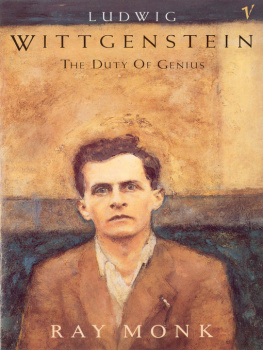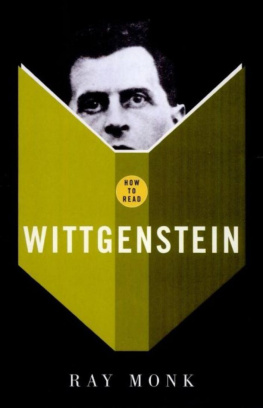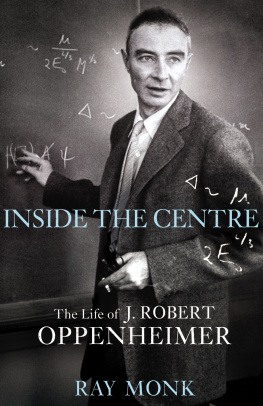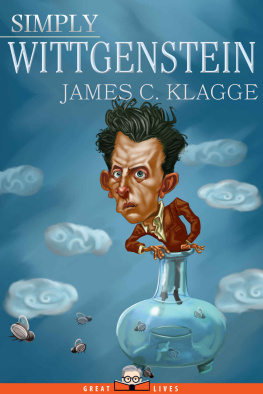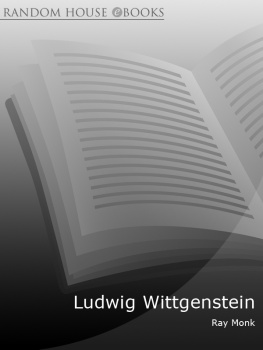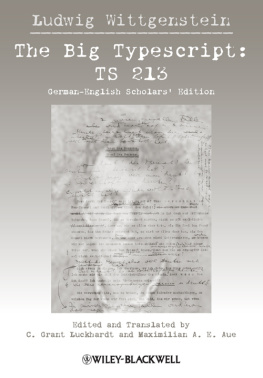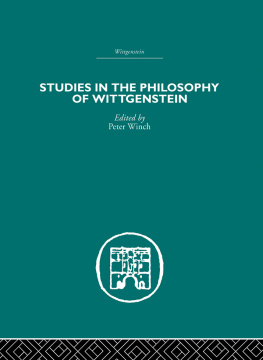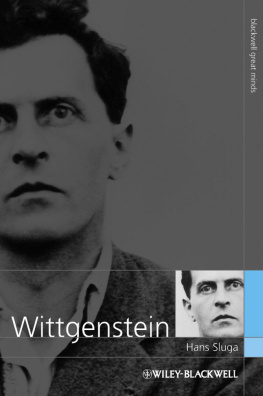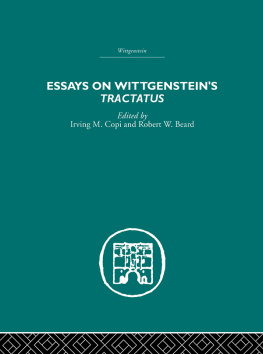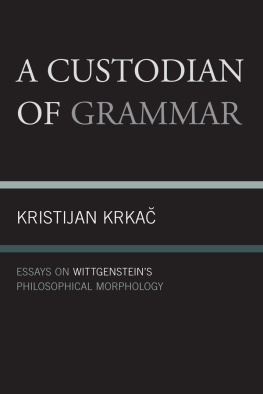CONTENTS
About the Author
Ray Monk gained a first class degree in Philosophy at York University and went on to Oxford, where he wrote his M.Litt. thesis on Wittgensteins philosophy of mathematics.
This biography transforms Wittgenstein into a human being. It shows his capacity for love, bumps away the hagiolatry, and cuts through a strange layer of po-faced schlock which is perhaps unique to his memory. It ties the philosophy to the life and brings clearly into view the immoderate, brilliant, moving and regularly insupportable genius For nearly 600 pages Monk moves between quotations, drawing on interviews and letters, diaries, and memoirs of Wittgenstein and his family and friends. He works them intelligently into continuity. His own speculative interventions about Wittgensteins feelings and motivations are never pushy or insistent, but well-supported, plausible and at the same time self-effacing His handling of the early philosophy is admirable. He has a gift for simple exposition, and knows what it is worth trying to get across to a largely non-philosophical audience.
Independent On Sunday
With a subject who demands passionate partisanship, whose words are so powerful, but whose actions speak louder, it must have been hard to write this definitive, perceptive and lucid biography. Out goes Norman Malcolms saintly Wittgenstein, Bartleys tortured, impossibly promiscuous Wittgenstein, and Brian McGuinnesss bloodless, almost bodiless Wittgenstein. This Wittgenstein is the real human being: wholly balanced and happily eccentric, with nothing much in common with his suicidal brother Rudolf, except his homosexuality. Allowed to speak for himself by a self-effacing author, this Wittgenstein knows his own military mind and nature, of which the suicidal gestures were deeply felt, but still gestures.
The Times
Ray Monk studied philosophy as an undergraduate and went on to write a dissertation on the philosophy of mathematics. In writing this book he has shown himself a more than competent biographer and historian of ideas It is both readable and easy to use, with a full index and bibliography. It is much to be recommended not least for its tolerant, non-judgmental, but sometimes sardonic tone.
Observer
Monk presents a portrait of real complexity: a sceptic (who in his early years was sceptical enough to disagree with Russell that it could be proved that there was not a rhinoceros in the room) and yet a mystic for whom certainty of a kind existed the certainty of unknowing. Monks biography is deeply intelligent, generous to the ordinary reader, and restrained about Wittgensteins homosexual relationships. It is a beautiful portrait of a beautiful life. After such rigour, such strictness and moral torment, there is a beauty and a release in Wittgensteins famous last words, Tell them Ive had a wonderful life.
Guardian
Monks energetic enterprise is remarkable for the interleaving of the philosophical and the emotional aspects of Wittensteins life. The biographical method here is comparative: Monk shows certain connections, but he does not argue them. He honours the master by his very method and renovates biography in the process.
Sunday Times
ILLUSTRATIONS
THE AUTHOR AND publishers would like to thank the following for permission to use photographs: Dr Milo Keynes (13); Anne Keynes (15); Dr Norman Malcolm (46); Michael Nedo (17, 912, 1934, 36, 3943, 47, 5054); Neue Pinakothek, Munich (photo: Artothek: 7); Gilbert Pattisson (378, 412, 445); Ferry Radax (1618, 48), Technische Hochschule, Berlin (now the Technical University of Berlin: 8); Trinity College, Cambridge (14, 35).
The infant Ludwig Wittgenstein The sons and daughters of Hermann and Fanny Wittgenstein Ludwig, c . 1981 The grand staircase in the Alleegasse A family photograph taken on Karl and Leopoldines silver wedding anniversary, 1898 Ludwig, aged nine Margarete Wittgenstein, painted by Gustav Klimt The Technische Hochschule in Charlottenburg, Berlin The family at the dinner table in the Hochreit Ludwig Wittgenstein, aged about eighteen With Eccles at the Kite-Flying Station in Glossop On the river in Cambridge, with John Maynard Keynes, Virginia Woolf and Rupert Brooke Members of the Moral Science Club, Cambridge, c . 1913 David Pinsent Postcards from Norway, 1913 Postcard to Eccles Wittgensteins house in Norway With the family at the Hochreit Wittgensteins military identity card during the First World War Wittgensteins room in the guest-house at Trattenbach Wittgenstein with his pupils in Puchberg am Schneeberg Frank Ramsey Wittgenstein, 1925 Examples of a window-catch and door-handle designed by Wittgenstein for his sisters house in the Kundmanngasse The Kundmanngasse house Portraits of Wittgenstein: on being awarded a scholarship from Trinity College, 1929, and a fellowship, 1930 Postcard to Gilbert Pattisson from Vienna Wittgenstein and Francis Skinner in Cambridge Wittgenstein with his niece Marie Stockert Postcard sent to Pattisson by Wittgenstein while on holiday in Tours, France, 1949 A typical bit of nonsense sent by Wittgenstein to Gilbert Pattisson Wittgenstein on holiday in France with Gilbert Pattisson Wittgensteins acerbic reaction to Chamberlains diplomacy at Munich Wittgenstein in the Fellows Garden at Trinity, 1939 From Wittgensteins photo-album: Francis Skinner; and family and friends at Christmas in Vienna The Kingstons farmhouse in Co. Wicklow, Ireland Tommy Mulkerrins outside his cottage in Connemara Wittgenstein in Swansea Wittgenstein and Ben Richards in London Wittgenstein in the garden at the von Wrights home in Cambridge Wittgenstein on his death-bed Wittgensteins grave, St Giles, Cambridge
TO JENNY


Logic and ethics are fundamentally the same, they are no more than duty to oneself.
Otto Weininger, Sex and Character
INTRODUCTION
THE FIGURE OF Ludwig Wittgenstein exerts a very special fascination that is not wholly explained by the enormous influence he has had on the development of philosophy this century. Even those quite unconcerned with analytical philosophy find him compelling. Poems have been written about him, paintings inspired by him, his work has been set to music, and he has been made the central character in a successful novel that is little more than a fictionalized biography ( The World as I Found It , by Bruce Duffy). In addition, there have been at least five television programmes made about him and countless memoirs of him written, often by people who knew him only very slightly. (F. R. Leavis, for example, who met him on perhaps four or five occasions, has made his Memories of Wittgenstein the subject of a sixteen-page article.) Recollections of Wittgenstein have been published by the lady who taught him Russian, the man who delivered peat to his cottage in Ireland and the man who, though he did not know him very well, happened to take the last photographs of him.
All this is, in a way, quite separate from the ongoing industry of producing commentaries on Wittgensteins philosophy. This industry too, however, continues apace. A recent bibliography of secondary sources lists no fewer than 5,868 articles and books about his work. Very few of these would be of interest (or even intelligible) to anyone outside academia, and equally few of them would concern themselves with the aspects of Wittgensteins life and personality that have inspired the work mentioned in the previous paragraph.
It seems, then, that interest in Wittgenstein, great though it is, suffers from an unfortunate polarity between those who study his work in isolation from his life and those who find his life fascinating but his work unintelligible. It is a common experience, I think, for someone to read, say, Norman Malcolms Memoir , to find themselves captivated by the figure described therein, and then be inspired to read Wittgensteins work for themselves, only to find that they cannot understand a word of it. There are, it has to be said, many excellent introductory books on Wittgensteins work that would explain what his main philosophical themes are, and how he deals with them. What they do not explain is what his work has to do with him what the connections are between the spiritual and ethical preoccupations that dominate his life, and the seemingly rather remote philosophical questions that dominate his work.
Next page
